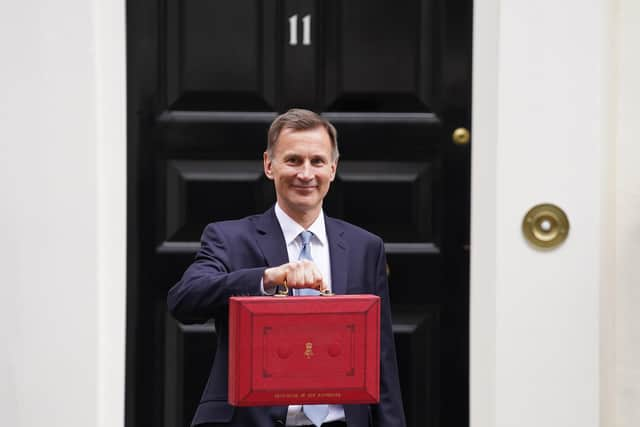GDP rebound: Has the UK economy exited recession and when will interest rates fall?
The latest official data on UK economic output would suggest that the recession is already behind us though the anaemic growth seen at the start of the year is hardly worth shouting about.
Gross domestic product (GDP) is estimated to have risen by 0.2 per cent in January, raising hopes that the country could be on its way out of a short and shallow technical recession. A strong month for retail sales helped drive growth in the opening weeks of 2024, with consumers making the most of post-Christmas sales and spending more in supermarkets. It was also helped by improved activity for housebuilders - providing some respite for a sector battered by high interest rates and weak buyer confidence.
Advertisement
Hide AdAdvertisement
Hide AdLast month, it emerged that Britain’s economy had contracted by 0.3 per cent in the final three months of 2023. Coupled with the decline of 0.1 per cent in the previous three months it meant that the UK entered a technical recession, as defined by two or more quarters in a row of falling output, or GDP. The last time the economy tumbled into recessionary territory was in the first half of 2020, when the initial pandemic lockdown took its toll.


A modest rebound in growth in January will raise hopes that the UK is already on its way out of what would be a short-lived and shallow downturn. However, we won’t know officially until May, when the Office for National Statistics (ONS) releases data for the whole of the first quarter of 2024.
Nicholas Hyett, investment manager at Wealth Club, said that if the return to growth can be sustained then the UK should be on course to exit recession “in pretty short order”, offering some relief for the government “even if the man or woman on the street is unlikely to notice the difference between anaemic growth and mild recession”.
Suren Thiru, economics director at the Institute of Chartered Accountants in England and Wales (ICAEW), said the slight rebound in GDP suggests the UK “took its first step towards exiting recession in January”. But he warned: “January’s recovery may have been followed by a more muted performance in February, with the significant wet weather likely to have suppressed activity, despite a boost to incomes from lower inflation.”
He added that interest rates are likely to remain unchanged this month, but that “with the economy struggling and inflation slowing, the case for loosening policy by the summer is growing”.


While the difference between muted growth and shallow contraction is of little consequence to those individuals and businesses still struggling with a cost-of-living crisis, shedding the recession label would be a positive development for stock markets and potential investors. There were some signs of a favourable reaction in the City to January’s GDP numbers.
Russ Mould, investment director at AJ Bell, noted: “While the figure is tiny, the fact it is growing at all is a positive. Investors want the UK’s recession status cast into the rear-view mirror so they can focus on how potential looser monetary policy could provide relief to consumers and businesses, and in turn feed into greater economic activity. Sadly, that could take time to play out.”
The services sector, which also includes industries like hospitality, culture and leisure, grew by 0.2 per cent during January and was the largest contributor to the rise in GDP. It was also helped by improved activity for housebuilders, thanks to new work and repair and maintenance jobs, following a sluggish year for the wider housing market. On Tuesday, the ONS revealed that real regular wages rose faster in January than the rate of consumer prices index (CPI) inflation for the average worker, suggesting inflationary pressures remain in the system. That is likely to weigh on Bank of England policymakers as they ponder the next move on interest rates, with borrowers hopeful of an initial cut come late spring or early summer, before further downward movements through the remainder of the year.
Advertisement
Hide AdAdvertisement
Hide AdRob Wood, chief UK economist for Pantheon Macroeconomics, estimated that GDP could grow by 0.3 per cent in the first three months of 2024, and that the first cut to interest rates could happen in June. The next meeting of the Bank of England’s rate-setting monetary policy committee is due to be held on Thursday 21 March though the bank base rate is expected to remain at 5.25 per cent.
Liz McKeown, director of economics statistics at the ONS, said: “The economy picked up in January, with strong growth in retail and wholesaling. Construction also performed well, with housebuilders having a good month, having been subdued for much of the last year. These were partially offset by falls in TV and film production, lawyers and the often-erratic pharmaceutical industry.”
Chancellor Jeremy Hunt said: “While the last few years have been tough, [these GDP] numbers show we are making progress in growing the economy - part of which makes it possible to bring down national insurance contributions by £900 this coming year. But if we want the rate of growth to pick up more we need to make work pay, which means ending the unfairness of taxing work twice.”
Shadow chancellor Rachel Reeves said Britain remains “worse off” and that Prime Minister Rishi Sunak’s claims that his plan for the economy is working are “already in tatters after Britain was hit by recession last year”.
Comments
Want to join the conversation? Please or to comment on this article.